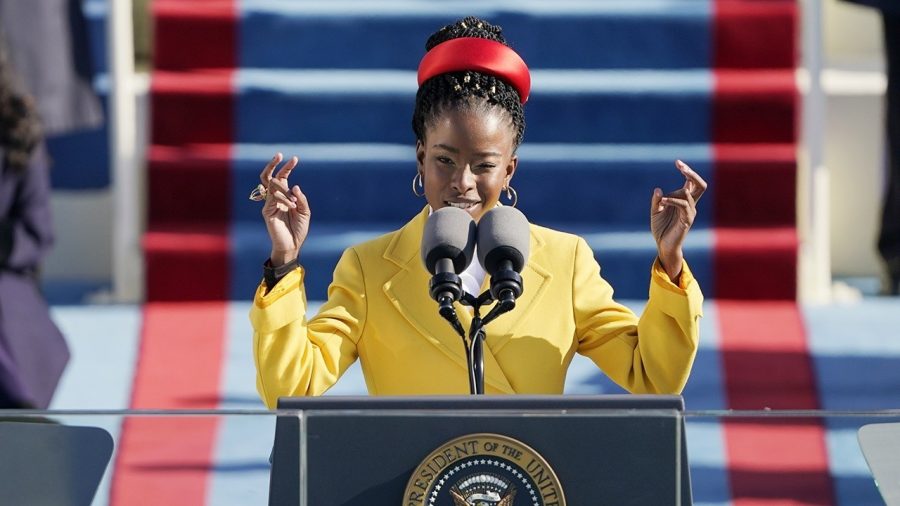The Hill We Climb: Amanda Gorman’s Poem Caught the World by Storm
National Youth Poet Laureate calls to summon America’s resilience.
February 6, 2021
On January 20, 22-year-old National Youth Poet Laureate Amanda Gorman stole the show at President Joe Biden’s inauguration ceremony. The First Lady, Jill Biden, is a huge supporter of Gorman’s work and recommended her to the inaugural committee, saying that she would be a perfect fit. Gorman did not sugarcoat recent events in her breathtaking and inspiring poem “The Hill We Climb,” as she used her words to illustrate how our country can unify and heal. In her bold and bright yellow blazer, Gorman eloquently and passionately called attention to racism and division, and summoned America’s resilience.
Gorman began writing poems as a child. Like Biden, she suffered from a speech impediment in her youth, as she struggled with stuttering and couldn’t pronounce certain sounds. Despite these challenges, Gorman became Los Angeles first Youth Poet Laureate at age 16, was named the first National Youth Poet Laureate at 19, and is now the youngest inaugural poet in U.S. history. Gorman was contacted by the Biden Inaugural Committee in late December and was encouraged to focus her writing on unity and hope.
In her poem, Gorman highlighted racial injustice in our country’s history but also offered optimism for a just future. Gorman achieved her dreams even when they seemed impossible to reach. She described her background as a “skinny Black girl, descended from slaves and raised by a single mother,” who can dream of being president one day, “only to find herself reciting for one.” Her poem made the point that you are more than what life dealt you: “Being an American is more than the past we inherit. It’s the past we step into and how we repair it.” Gorman’s words reflect her belief that America is not a perfect place, nor is it equal for all people. But it is up to us to learn from the past, and moreover to repair what is wrong with society.
According to The New York Times, Gorman was halfway through her poem when pro-Trump rioters violently stormed Congress on January 6. That night, she finished her poem and reflected on the frightening events the country had endured and the fragile state of our democracy.
“We’ve seen a force that would shatter our nation rather than share it,” Gorman wrote. “Would destroy our country if it meant delaying democracy, and this effort very nearly succeeded, but while democracy can be periodically delayed, it can never be permanently defeated.”
Gorman’s words highlighted the strength of our democratic system. In particular, efforts to change the results of the election were not only shut down, but democracy held firm when faced with division. Despite others’ attempts to resist a peaceful transfer of power, Biden entered office January 20, 2021. In contrast to the division, Gorman spoke of possible unity and reconciliation: “And yet the dawn is ours before we knew it. Somehow, we do it. Somehow, we’ve weathered and witnessed a nation that isn’t broken but simply unfinished.”
Gorman’s “The Hill We Climb” demonstrated the impact of poetry and language, as she offered a hopeful and healing vision for a deeply divided country. While many poets write in figurative and abstract language, Gorman uses clear and bold words that advance and underscore her activism.
It is important that SLS students embody her last lines:
When day comes we step out of the shade,
aflame and unafraid
The new dawn blooms as we free it
For there is always light,
if only we’re brave enough to see it
If only we’re brave enough to be it
Gorman emphasizes positivity. We have to be brave enough to put all the chaos of the election and the virus aside, see the light, and, in turn, be the light. To do this, reach out to your friends and family who might be struggling and provide support, kindness, and laughter.





Elaine Camerota • Feb 6, 2021 at 11:03 am
Wonderful article, article, Ale!